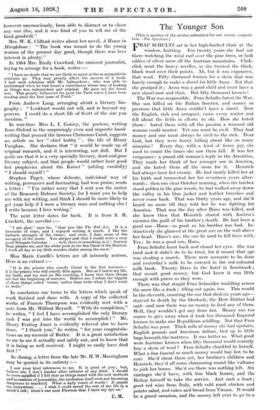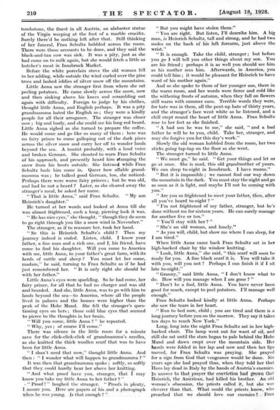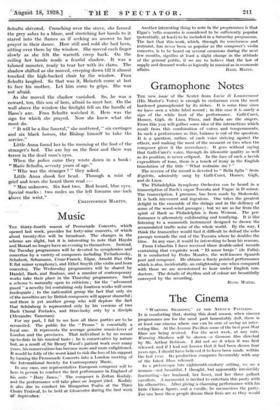The Younger Son
[This is another of the stories submitted for our recent competi- tion.—En. Spectator.] FRAU SCHULTZ sat in her high-backed chair at the window, knitting. For twenty years she had sat there watching the wind curl over the pine trees, or lash eddies of silver snow oft the Austrian mountains. Click- click went the heavy needles, as she twisted the thick, black wool over their points. Ah, but it was expensive, that wool. Fifty thousand kronen for a skein that was barely enough to make a shawl for little Anna. Not that she grudged it ; Anna was a good child and must have a new shawl now and then. But fifty thousand kronen !
The War was responsible. Frau Schultz hated the War. One son killed on the Italian frontier, and money so precious that little Anna couldn't have a shawl. Now the English, rich and arrogant, came every winter and fell about the fields in efforts to ski. How she hated them : hated them with all the passion a wizened old woman could muster. Yet one must be civil. They had money and one must always be civil to the rich. Dear God, but they were funny falling about like so many ninepins ! Every day, with a kind of fierce joy, she used to count the times she saw them fall. It was her vengeance : a proud old woman's reply to the Armistice. They made her think of her younger son in America, and she hated them all the more for it. Heinrich had always been her enemy. He had nearly killed her at his birth and tormented her for seventeen years after- wards ; then one clear October morning, when the larches stood golden in the pine woods, he had walked away down the valley in his blue jacket and leather breeches and never come back. That was thirty years ago, and she'd heard no more till they told her he was fighting for America. That was the day after Hans was killed, and she knew then that Heinrich shared with Austria's enemies the guilt of his brother's death. He had been a good son—Hans--as good as his brother was bad. In- stinctively she glanced at the great axe on the wall above her head. Hans's axe, the one he used to fell trees with. Yes ; he was a good son, Hans.
Frau Schultz leant back and closed her eyes. She was tired and it didn't do to be tired, for it meant that age was stealing a march. There were accounts to be done and yesterday's milk to be entered in the red-coloured milk book. Twenty litres to the hotel in Innsbruck ; that meant good money, but God knew it was little enough with prices as they were.
There was that stupid Frau Schneider waddling across the snow like a duck ; filling out again, too. This would be the eleventh, counting the one that died six years ago— starved to death by the blockade, the Herr Dolctor had said—and now there was no money to feed any of them. Well, they wouldn't get any from her. Money was too scarce to give away when it took ten thousand Imperial kronen to make one Republican schilling. Not that Frau Schultz was poor. Thick rolls of money she had upstairs, English pounds and American dollars, tied up in little bags beneath the mattress. It was better so. What good were Austrian kronen when fifty thousand would scarcely buy a skein of wool ? Frau Schultz chuckled to herself. What a fine funeral so much money would buy her, to be sure. She'd cheat them yet, her brother's children and Heinrich, they'd all come clamouring round like vultures to pick her bones. She'd see there was nothing left. Six carriages she'd have, with fine black horses, and the Bishop himself to take the service. And such a feast ; good red wine from Italy, with cold roast chicken and potato salad, and cakes and bread from :Vienna. It would be a grand occasion, and the money left over to go to a tombstone, the finest in all Austria, an alabaster statue of the Virgin weeping at the foot of a marble crucifix.
Surely there'd be nothing left after that. Still thinking of her funeral, Frau Schultz hobbled across the room. There were those accounts to be done, and they said the black-and-tan cow was sick. It was a pity, just as she had come on to milk again, but she would fetch a little as butcher's meat in Innsbruck Market.
Before the white porcelain stove the old woman fell to her adding, while outside the wind curled over the pine trees and lashed eddies of silver snow off the mountains.
Little Anna saw the stranger first from where she sat peeling potatoes. He came slowly across the snow, now and then sinking above his knees and scrambling out again with difficulty. Foreign to judge by his clothes, thought little Anna, and English perhaps. It was a pity grandmamma hated the English so ; they were a kindly people for all their arrogance. The stranger was closer now ; big and burly, and she could see his long red beard.
Little Anna sighed as she turned to prepare the coffee.
He would come and go like so many of them : here was no fairy prince to come galloping out of the dark pines across the silver snow and carry her off to wonder lands beyond the sea. A tourist probably, with a loud voice and broken German. She shouted to warn Frau Schultz of his approach, and presently heard him stamping the snow from his boots outside. She listened while Frau Schultz bade him come in. Queer how affable grand- mamma was ; he talked good German, too, she noticed. Perhaps there were worse fairy princes ; but he was old, and had he not a beard ? Later, as she cleared away the stranger's meal, he asked her name.
. "That is little Anna," said Frau Schultz. "My son Heinrich's daughter."
He turned at her words and looked at Anna till she was almost frightened, such a long, piercing look it was. "He has nice eyes," she thought, "though they do seem to go right through you like a snow wind in November." The stranger, as if to reassure her, took her hand.
"So this is Heinrich Schultz's child ? Then my journey indeed is ended. Listen, child. I know your father, a fine man and a rich one, and I, his friend, have come to find his daughter. Will you come to America with me, little Anna, to your father's great farm, with its herds of cattle and sheep ? You must let her come, madam," he said, turning to Frau Schultz as if he had just remembered her. "It is only right she should be with her father."
Little Anna's eyes were sparkling. So he had come, her fairy prince, for all that he had no charger and was old and bearded. And she, little Anna, was to go with him to lands beyond the sea—to America, where all the people lived in palaces and the houses were higher than the peak of the Hohe Mund. She felt the stranger's ques- tioning eyes on hers ; those cold blue eyes that seemed to pierce to the thoughts in her brain.
"Will you come, little Anna ? " he repeated.
"Why, yes ; of course I'll come."
There was silence in the little room for a minute save for the click-click-click of grandmamma's needles, as she knitted the thick woollen scarf that was to have been for little Anna.
"I shan't need that now," thought little Anna. And then : "I wonder what will happen to grandmamma ? "
It was then that grandmamma spoke ; softly, so softly that they could hardly hear her above her knitting.
"And what proof have you, stranger, that I may know you 'take my little Anna to her father ? " . "Proof I " laughed the stranger. "Proofs in plenty, I assure you. Here are papers of his and a photograph when he as young. Is that enough ? " "But you might have stolen them."
"You are right. But listen, I'll describe him, A big man, is Heinrich Schultz, tall and strong, and he had two moles on the back of his left forearm, just above the wrist."
"It is enough. Take the child, stranger ; but before you go I will tell you other things about my son. You are his friend ; perhaps it is as well you should see him as his mother sees him. Afterwards, in America, you could tell him ; it would be pleasant for Heinrich to have word of his mother again."
And so she spoke to them of her younger son, there in the warm room, and her words were fierce and cold like the withering frosts of autumn, when they fall on flowers still warm with summer suns. Terrible words they were, for hate was in them, all the pent-up hate of thirty years, and the stranger's face went white as he listened, and a chill crept round the heart of little Anna. Frau Schultz rose to her feet as she finished.
"A bad son he was to me," she said, "and a bad father he will be to you, child. Take her, stranger, and may she forgive you for this day's work."
Slowly the old woman hobbled from the room, her two sticks going tap-tap on the floor as she went.
The stranger turned to little Anna.
"We must go," he said. "Get your things and let us go at once. She is mad, this old grandmother of yours. We can sleep to-night in Innsbruck. I have rooms."
"But it is impossible ; we cannot find our way down the mountain in the dark. You must stay the night and go as soon as it is light, and maybe I'll not be coming with you."
"Are you so frightened to meet your father, then, after all you've heard to-night ? "
"I'm not frightened of my father, stranger, but he's done without me for sixteen years. He can surely manage for another five or ten."
"You'll stay with her ? "
"She's an old woman, and lonely."
"As you will, child, but show me where I can sleep, for I am tired."
When little Anna came back Frau Schultz sat in her high-backed chair by the window knitting.
"Look, little Anna," she said," this scarf will soon be ready for you. A fine black scarf it is. You will take it with you, will you not ? Perhaps I can finish it if I sit late to-night."
"Granny," said little Anna, "I don't know what to do. How will you manage when I am gone ?
"Don't be a fool, little Anna. You have never been good for much, except to peel potatoes. I'll manage Well enough."
Frau Schultz looked kindly at little Anna. Perhaps she saw the tears in her heart.
." Run to bed now, child ; you are tired and there is a long journey before you on the morrow. They say it takes ten days to reach New York."
Long, long into the night Frau Schultz sat in her high- backed chair. The lamp went out for want of oil, and still she sat until the stars began to pale behind the Hohe Mund and dawn crept over the mountain side. Her hands were folded in her lap and now and then her lips moved, for Frau Schultz was praying. She prayed for a sign from God that vengeance would be done. Six years ago she had prayed thus, when they told her that Hans lay dead in Italy by the hands of Austria's enemies.
In answer to that prayer the conviction had grown that Heinrich, the American, had killed his brother. An old woman's obsession, the priests called it, but she was cleverer than that. What could the priests know, who preached that we should love our enemies?..: Frau Schultz shivered. Crouching over the stove, she fanned the grey ashes to a blaze, and 'stretching her hands to it stared into the flames as if seeking an answer to her prayer in their dance. }tow still and cold she had been, sitting over there by the window. She moved each finger slowly as she felt the warmth creep back. On the ceiling her hands made a fearful shadow. It was a taloned monster, ready to tear her with its claws. The Shadow shifted as she moved, creeping down till it almost touched the high-backed chair by the window. Fmu Schultz laughed. So that was it, Heinrich come at last to 'face his mother. Let him come to grips. She was not afraid.
As She moved the shadow vanished. So, he was a coward, too, this son of hers, afraid to meet her. On the wall above the window the firelight fell on the handle of Hans's axe. Frau Schultz watched it. Here was the sign for which she prayed. Now she knew what she must do.
"It will be a fine funeral," she muttered, "six carriages and six black horses, the Bishop himself to take the service."
Little Anna found her in the morning at the foot of the stranger's bed. The axe lay on the floor and there was terror in the dead man's eyes.
When the police came they wrote down in a book : "Marie Schultz, seventy years of age."
"Who was the stranger ? " they asked.
Little Anna shook her head. Through a mist of grief and tears she heard them read :— "Man unknown. Six foot two. Red beard, blue eyes. Special marks : two moles on the left forearm one- inch above the wrist."
CHRISTOPHER MARTIN.


































 Previous page
Previous page